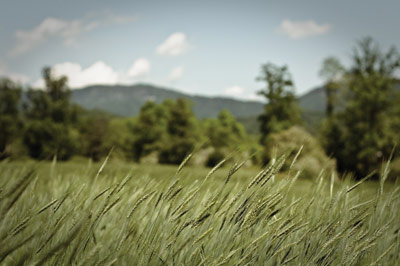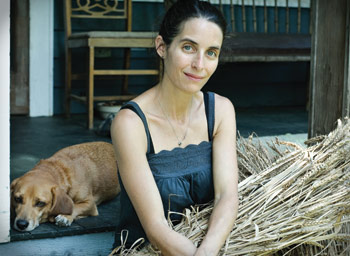Jennifer Lapidus credits the inspiration for the North Carolina Bread Flour Project to a wheat shortage.

The initiative, the brainchild of Lapidus, the former owner of Natural Bridge Bakery, will appear in the pages of Food and Wine Magazine later this year. It's no wonder: Lapidus' project is fascinating. After a series of brainstorming sessions with local bakers, and with the aid of a special mill that was shipped in one piece from Tasmania, Lapidus is bringing seven WNC bakeries together and working to close the chain of bread production.
While lack of flour may seem a strange muse, Lapidus ties it all together deftly in her rapid-fire way of speaking.
In 2008, she explains, a wheat deficit caused the price of flour to skyrocket — even as the quality suffered. "It was a perfect storm on many levels, and I was not baking and trying to figure out what to do next."
So, she says, she began to sample locally grown varieties of wheat — the results of the North Carolina wheat trials, a program sponsored by the Carolina Farm Stewardship Association. Backed by the state Tobacco Trust and a New Mexico tobacco grower, the association was attempting to introduce wheat to North Carolina as a viable cash crop.
"I had a couple of different varieties sent to my bakery through channels that I was already working with as a baker, and the results were a lot more decent than any of us had expected," Lapidus says. Thus, the first kernel of inspiration: Good wheat, it seemed, could be grown in North Carolina. It's been pointed out before that the historic prevalence of biscuits in these parts is directly related to the lack of grain options.
Adding fuel to the growing fire in her imagination, while waiting at a hair salon, she happened on a magazine article about bread. The story detailed Perche, a small French city that utilized a 400-year old mill to turn local grain that had once been simply tossed to the cattle to make bread — bread that would eventually make news. "There's 13 bakeries in an area of 11,000 residents. They basically started this project of linking the farm and the mill and the baker to make the first geographically distinct bread — the baguette du Perche."

Inspired by the work of the French town, as well as the troubles of the small local bakeries that were having a tough time getting worthwhile baking flour, Lapidus sprung to action, forming a baker's coalition. "Millers weren't letting go of anything because they didn't have enough grain for flour. I saw the little guys getting hurt." With the cooperative, she says, the bakers could work together to have a formative voice and work directly with the growers, buying in bulk and making the transaction worthwhile for all involved.
Thus was born the entity known as the North Carolina Organic Bread Flour Project, Lapidus' effort to close the gaps in the chain of bread-making. "Fostering the relationship between the grower, miller and baker provides a tangible level of security for all three," she says. The project also led to an effort to inspire local growers to produce grains for bread in order to foster a closer connection between the farmer and baker.
Seven bakeries are involved in the project; Annie's Naturally, Flat Rock Village, Farm & Sparrow, Loafchild, Wake Robin Farm Breads, West End and Wildflour. They are devoted to promoting the benefits of milling sustainably grown, local, organic wheat — which benefits the rest of us in the form of good bread and a vital local economy. Eventually, as Lapidus explains in the mission statement, the project hopes to effectively "build the infrastructure in N.C. for the storage, cleaning and processing of N.C. organically grown grain into flour."
The Carolina Farm Stewardship — the same group that funded the wheat trials — has offered support for this initiative with the help of the Tobacco Trust Fund, Sante Fe Tobacco, the USDA and others. Under these sponsors, the NCOBFP has begun hosting workshops for growers, in order to help them learn to raise the types of grains that the North Carolina climate can support. Eventually, those grains will become the basis for our own, geographically distinct bread.
Still, there was one more problem to solve. How then, does the local, organic grain become the local, organic flour, that becomes the bread?
The answer: that Tasmanian mill — a 48" diameter stone-burr Osttiroller grist mill with sifters, to be exact — purchased from the estate of the late Alan Scott, pioneering oven-builder and mentor to Lapidus. Scott was so instrumental to bread-making, so highly respected, that the New York Times published a half-page obituary after his death last year. To Lapidus, it's an honor to have his mill, and a further honor to receive funding from her sponsors for her mission — something that proves to her that North Carolina grain and bread-making is being taken seriously.
Much more is in the works for the project. Follow the group's progress on Lapidus' blog at ncobfp.blogspot.com.



The North Carolina Organic Bread Flour Project presents, in conjunction with Carolina Farm Stewardship Association and with funding from the North Carolina Tobacco Trust Fund Commission:
NC-Grown Organic Wheat—from field to bread
Thursday, June 17th, 2010
9 a.m. to 10:30 a.m.
at the Mountain Research Station, Waynesville, NC
USDA-ARS wheat breeder Dr. David Marshall will provide an overview of the bread wheat trials planted at the station, and will discuss varieties of hard wheat that grow well in NC and their quality components.
Organic crop consultant Sharon Funderburk will follow Dr. Marshall’s talk, providing organic methods in addressing fertility concerns and/or other issues that can be addressed in the field to ensure a food quality crop.
Molly Hamilton, Extension Assistant, NCSU, will give an overview of the North Carolina Organic Grain Project and the services they provide.
And lastly, Jennifer Lapidus, project coordinator of the North Carolina Organic Bread Flour Project will discuss the project, its timeline, its bakers, and the mill.
This workshop is free and open to the public.
Registration is requested. To register for the workshop, go to:
https://www.netforumondemand.com/eWeb/Shopping/Shopping.aspx?Cart=0&Site=CFSA.
Date: Thursday, June 17, 2010
Time: 9:00am – 10:30am
Location: Mountain Research Station
265 Test Farm Rd
Waynesville, NC 28786
(828) 456-3943